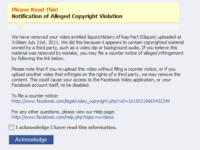The initial emphasis on last week’s Supreme Court of Canada’s copyright notice decision has focused on how Internet providers can pass along the specific costs associated with subscriber disclosures beyond those required for the notice-and-notice system to rights holders. The ruling rightly restores the notice system back to its intended approach, but it is not the only takeaway with implications for the recent flurry of file sharing lawsuits. While there has been a huge number of claims filed in Canada (with some surprisingly large settlements), the Supreme Court acknowledged important limitations in notice claims, noting that merely being associated with an IP address is not conclusive of guilt.
Archive for September 18th, 2018

Law Bytes
Episode 256: Jennifer Quaid on Taking On Big Tech With the Competition Act's Private Right of Access
byMichael Geist

Episode 256: Jennifer Quaid on Taking On Big Tech With the Competition Act's Private Right of Access
February 2, 2026
Michael Geist
The Law Bytes Podcast, Episode 255: Grappling with Grok – Heidi Tworek on the Limits of Canadian Law
January 26, 2026
Michael Geist
December 22, 2025
Michael Geist
December 8, 2025
Michael Geist
December 1, 2025
Michael Geist
Search Results placeholder
Recent Posts
 The Law Bytes Podcast, Episode 256: Jennifer Quaid on Taking On Big Tech With the Competition Act’s Private Right of Access
The Law Bytes Podcast, Episode 256: Jennifer Quaid on Taking On Big Tech With the Competition Act’s Private Right of Access  Government Says There Are No Plans for National Digital ID To Access Services
Government Says There Are No Plans for National Digital ID To Access Services  Government Reveals Digital Policy Priorities in Trio of Responses to Canadian Heritage Committee Reports
Government Reveals Digital Policy Priorities in Trio of Responses to Canadian Heritage Committee Reports  The Law Bytes Podcast, Episode 255: Grappling with Grok – Heidi Tworek on the Limits of Canadian Law
The Law Bytes Podcast, Episode 255: Grappling with Grok – Heidi Tworek on the Limits of Canadian Law  Canadian TikTok Ban Called Off as the Government Hits the Digital Policy Reset Button Once Again
Canadian TikTok Ban Called Off as the Government Hits the Digital Policy Reset Button Once Again

